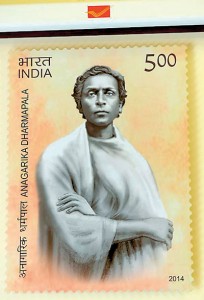News
Strong Indo-Lanka bonds will continue to our mutual benefit- Indian President
Indian President Pranab Mukherjee yesterday released at a commemorative postage stamp on Anagarika Dharmapala, the Sri Lankan Buddhist revivalist and national freedom fighter at a ceremony at Rashtrapathi Bhawan in New Delhi.
“The release of the commemorative postage stamp on Anagarika Dharmapala will contribute towards further strengthening the bilateral ties between India and Sri Lanka and bring the two nations closer,” President Mukherjee said. For the first time, India and Sri Lanka have agreed to issue stamps commemorating the 150th birth anniversary of Srimath Anagarika Dharmapala.
Earlier Sri Lanka also issued a stamp to mark his 150th birth anniversary.
President Mukherjee said relations between the two countries will continue to further strengthen in the coming years to the mutual benefit of our two peoples.
“This stamp release on one of the apostles of Buddhism, once again reminds us to work relentlessly and collectively to ensure an era of peace, stability and friendly bilateral and multilateral ties in order to create an enabling environment for the rapid socio-economic development of the people,”
He said that historically, India and Sri Lanka have remained natural allies.
“The relations between the two countries have withstood the test of time and socio-cultural exchanges for centuries have fostered further close cooperation in various fields. Both countries have much to learn and imbibe from each other in order to resolve various issues which are the legacies of a protracted period of colonial rule”, he said.
He expressed confidence that the ties between the two countries will continue “to further strengthen in the coming years to the mutual benefit of our two peoples”.
“Buddhism, one of the major religions in the world began in India and is a faith based on non-violence and the pursuit of spiritual excellence rather than material aggrandisement. Its principles continue to have great relevance even in this age. Buddhism promotes peace and stability and strongly advocates the spirit of compassion and tolerance. It aims to wean humanity away from war and skirmishes and inspires people to channelise their collective energy towards the betterment of society, “he said.
“Anagarika Dharmapala was one of the founding contributors of Sinhalese Buddhist nationalism and was also a pioneer in the revival of Buddhism in India. He not only embraced Buddhism but also lent it a Sinhalese nationalist character. He waged a protracted struggle to protect and conserve the foundations of Buddhism in its place of birth, India. He joined the Theosophical Society and spearheaded the reform and revival of Ceylonese Buddhism and its propagation. He later entered the order of Buddhist monks as Venerable Sri Devamitta Dharmapala and is considered a Bodhisattva in Sri Lanka. He was ordained a bhikkhu at Sarnath in 1933 and he died there in December of the same year”, he added.
“In 1891, Anagarika Dharmapala went on a pilgrimage to the Mahabodhi Temple at Bodh Gaya, where the Buddha had attained enlightenment. He decided to work towards restoring its glory. Accordingly, the Maha Bodhi Society was founded in 1891 and one of its primary aims was the restoration to Buddhist the control of the Mahabodhi temple at Bodh Gaya.”
“Many people remember Anagarika Dharmapala for his religious zeal. But there was another aspect to this towering figure – his practical vision regarding the alleviation of poverty. The voice of Anagarika Dharmapala was also a significant factor in Ceylon’s historical struggle for freedom from the British Raj. He spoke of the importance of a firm educational and economic foundation if the struggle for freedom was to succeed. He also concentrated on establishing schools and hospitals in his country. He had a vision of a newly emerging Ceylon, which could effectively link up with other countries and forge ahead,” the Indian President said.

